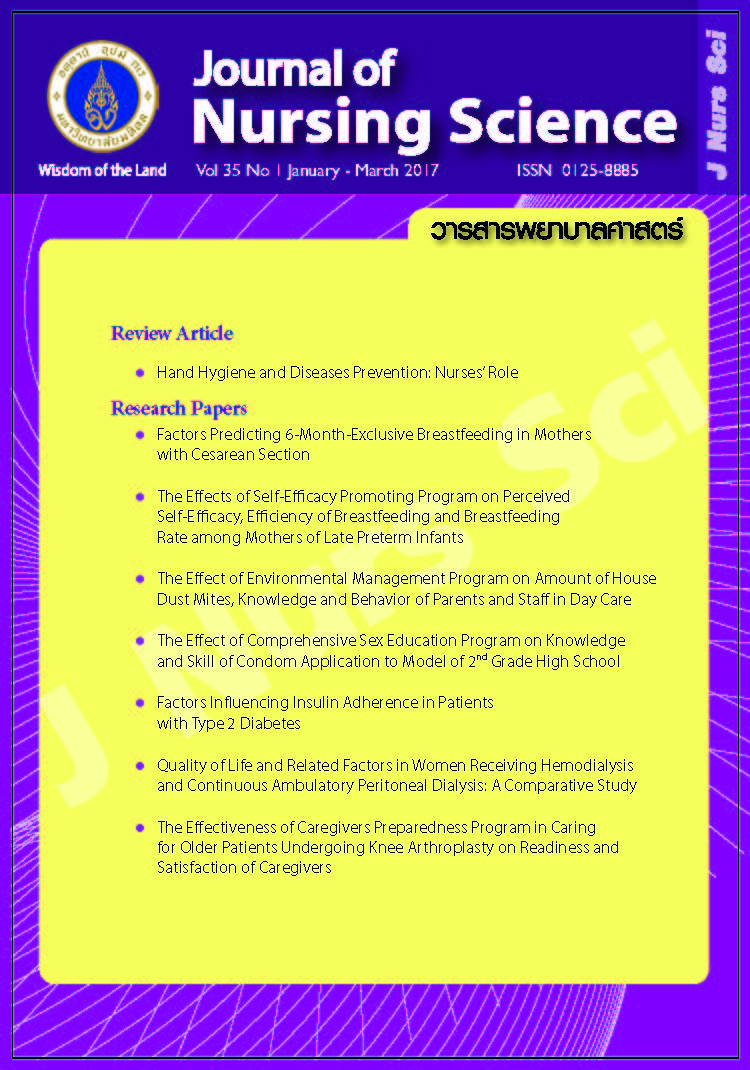The Effectiveness of Caregivers Preparedness Program in Caring for Older Patients Undergoing Knee Arthroplasty on Readiness and Satisfaction of Caregivers
Main Article Content
Abstract
Abstract
Purpose: The study was aimed at investigating the effectiveness of caregiver’s preparedness program in caring for older patients undergoing knee arthroplasty on readiness and satisfaction of caregivers.
Design: Quasi-experimental research.
Methods: The sample consisted of 52 caregivers of older adults who underwent knee arthroplasty and were admitted into the surgical ward of one tertiary hospital in Chonburi province. The sample were recruited by purposive sampling at the outpatient orthopedics clinic, 26 subjects assigned into the control group, while 26 subjects in the experimental group received the caregiver preparedness program developed by the researcher. Data were collected using the demographic data form, the readiness for care questionnaire, and the satisfaction with the caregiver preparedness program questionnaire. Data were analyzed by descriptive statistics, Chi-square, and t-test.
Main findings: The post-test mean score on readiness for care of caregivers in the experimental group was significantly higher than the pre-test mean score obtained before receiving the program and higher than those in the control group (p < .05). The post-test mean score of satisfaction with the caregiver preparedness program of the caregivers in the experimental group was significantly higher than in the control group (p < .05).
Conclusion and recommendations: The caregiver preparedness program was effective to increase readiness and satisfaction of caregivers of older patients undergoing knee arthroplasty. Nurses should promote readiness by implementing the caregiver preparedness program starting with dissemination of education before the day of admission.
ประสิทธิผลของโปรแกรมการเตรียมความพร้อมในการดูแลผู้ป่วยสูงอายุที่ได้รับการผ่าตัดเปลี่ยนข้อเข่าเทียม ต่อความพร้อมในการดูแลและความพึงพอใจของผู้ดูแล
บทคัดย่อ
วัตถุประสงค์: เพื่อศึกษาประสิทธิผลของโปรแกรมการเตรียมความพร้อมในการดูแลผู้ป่วยสูงอายุที่ได้รับการผ่าตัดเปลี่ยนข้อเข่าเทียม ต่อความพร้อมในการดูแลและความพึงพอใจของผู้ดูแล
รูปแบบการวิจัย: การวิจัยกึ่งทดลอง
วิธีดำเนินการวิจัย: กลุ่มตัวอย่างเป็นผู้ดูแลผู้ป่วยสูงอายุที่ได้รับการผ่าตัดเปลี่ยนข้อเข่าเทียมในหอผู้ป่วยศัลยกรรมพิเศษของโรงพยาบาลระดับตติยภูมิแห่งหนึ่งในจังหวัดชลบุรี เลือกกลุ่มตัวอย่างตามเกณฑ์เฉพาะเจาะจงที่ฝ่ายผู้ป่วยนอกคลินิกศัลยกรรมกระดูกและข้อ กลุ่มควบคุม 26 ราย ได้รับการพยาบาลตามปกติและกลุ่มทดลอง 26 ราย ได้รับโปรแกรมการเตรียมความพร้อมในการดูแลที่ผู้วิจัยพัฒนาขึ้นตามแนวคิดการดูแลครอบครัว รวบรวมข้อมูลโดยใช้แบบบันทึกข้อมูลส่วนบุคคล แบบประเมินความพร้อมในการดูแล และแบบประเมินความพึงพอใจต่อการเตรียมความพร้อมในการดูแลผู้ป่วยสูงอายุที่ได้รับการผ่าตัดเปลี่ยนข้อเข่าเทียม วิเคราะห์ข้อมูลโดยใช้สถิติบรรยายการทดสอบไคสแควร์ และสถิติทดสอบค่าที
ผลการวิจัย: ผู้ดูแลผู้สูงอายกลุ่มทดลองหลังได้รับโปรแกรมการเตรียมความหร้อมในการดูแลมีค่าเฉลี่ย ของคะแนนความพร้อมในการดูแลก่อนจำหน่ายผู้ป่วยออกจากโรงพยาบาลสูงกว่าก่อนได้รับโปรแกรมการเตรียมความพร้อมและสูงกว่าผู้ดูแลในกลุ่มควบคุมที่ได้รับการพยาบาลตามปกติอย่างมีนัยสำคัญทางสถิติ (p < .05) ผู้ดูแลผู้ป่วยสูงอายุกลุ่มทดลองมีคะแนนเฉลี่ยความพึงพอใจต่อการเตรียมความพร้อมในการดูแลสูงกว่าในกลุ่มควบคุมอย่างมีนัยสำคัญทางสถิติ (p < .05)
สรุปและข้อเสนอแนะ: โปรแกรมการเตรียมความพร้อมมีประสิทธิผลในการเพิ่มความพร้อมในการดูแล และความพึงพอใจของในการดูแลผู้ป่วยสูงอายุที่ได้รับการผ่าตัดเปลี่ยนข้อเข่าเทียม ดังนั้น พยาบาลควรเตรียมความพร้อมของผู้ดูแลให้มีส่วนร่วมในการดูแล โดยประยุกต์ใช้โปรแกรมการเตรียมความพร้อมตั้งแต่กระบวนการสอนสุขศึกษาก่อนวันรับผู้ป่วยเข้านอนโรงพยาบาล
คำสำคัญ: โปรแกรมการเตรียมความพร้อมในการดูแล ผู้ดูแล ความพร้อมในการดูแล ความพึงพอใจ
Article Details
Copyright Notice: Nursing Science Journal of Thailand has exclusive rights to publish and distribute the manuscript and all contents therein. Without the journal’s permission, the dissemination of the manuscript in another journal or online, and the reproduction of the manuscript for non-educational purpose are prohibited.

Disclaimer: The opinion expressed and figures provided in this journal, NSJT, are the sole responsibility of the authors. The editorial board bears no responsibility in this regard.


